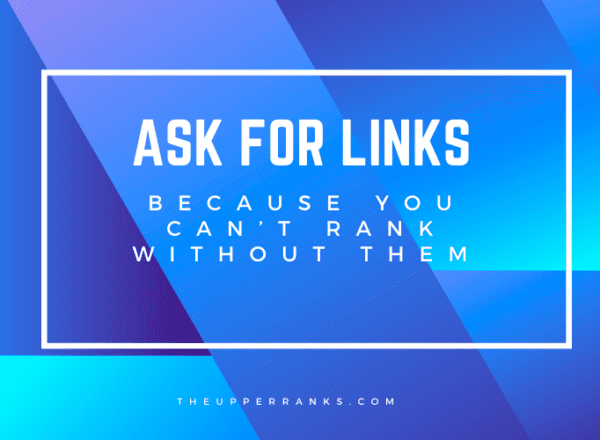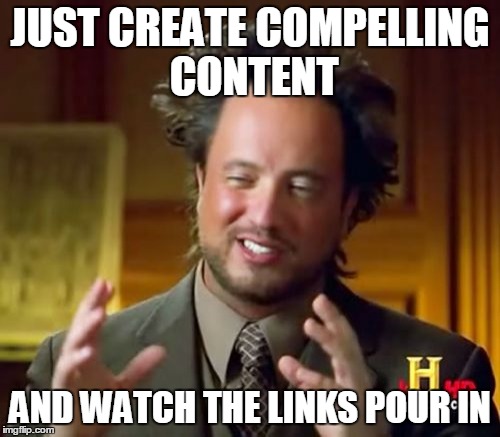How good is the best website in the world if no one ever sees it?
Is it still the best website in the world?
Let’s get sidetracked for a second.
Imagine the best movie ever made.
It has great acting, authentic costumes, dialogue that’s both realistic and witty, romance, humor and an epic scene where a news helicopter chases a rogue ice cream truck across a frozen river.
Sounds great, doesn’t it?
Well, it’s only a great movie if someone sees it.
Imagine the producers of the best film in the world never asked anyone to see their movie.
No one ever heard about it because they never invited anyone to view a screening.
The only people to ever see the greatest piece of cinema ever created were the people that created it.
It’s a tragic hypothetical story, but it’s a story that applies to hundreds of thousands of websites.
No one ever sees them in search results because they have no links; and they have no links because they never asked for any.
Links are the difference between popularity and invisibility.
You’re Unlikely to Rank Without Links
No matter how many people badmouth SEO and link building, websites just don’t tend to rank without good, relevant links.
The rhetoric surrounding link building changes all the time.
It often falls in and out of favor, and processes are constantly refined by the best minds in search marketing.
It doesn’t matter what the latest buzzwords are, though— links still matter.

Out of the top results, a full 99.2% of all websites had at least one external link. (The remaining .8% is well within the margin of error expected between Mozscape and Google’s own link index.)
The study found almost no websites ranking for competitive search phrases that didn’t have at least a single external link pointing at them, and most had significantly more links.
A whopping 99% of websites ranking for competitive keywords had at least one external link. Most of them have many more.
What more? Google themselves recently confirmed that links are one of the top ranking factors.
That’s certainly something to think about, right?
A Quick Note on Good Links
Before you start thinking about how you can gobble up as many links as possible, let’s take a step back for a moment.
There are good links and there are bad links. Bad links come from spammy websites, irrelevant websites, unsecure websites and robot-curated directories that no human has ever laid eyes upon.
Good links come from relevant websites and they’re created and constantly monitored by human beings. If you build a dozen spammy links to your site, you might not get penalized– but you surely won’t see any improvement in your search rankings either.
Your links need to be relevant. Every link has to be thoughtful. Every link has to be something that makes sense– something a human being would actually click on.
Most people would be surprised to learn how many links don’t actually help you to rank, or can actually hurt. To play within Google’s good graces, it’s best to understand Google’s guidelines on manipulative link building, and knowing what types of links to avoid. The safest link building is simply link earning, and to get your content in front of the right people.
But we’re getting to that old conundrum of link earning vs. link building again. If you never, ever ask for a link (aka build a link) in the first place, how will anyone ever find out about your site? After all, it would be impossible for someone to link to a website that they don’t even know exists?
Content marketing experts can talk about ‘compelling content’ and ‘link earning’ until they’re blue in the face, but webmasters can’t link to a website that they can’t find.
You need to get your website in front of the right people.
Link earning, link building, public relations, content promotion; call it what you will. It’s still just fine to ask for links, as long as you don’t violate Google’s link schemes guidelines.
Don’t let anyone prod you into panic.
Links in Action
So what do good links actually look like in the wild?
They’re not just blue underlined text in a blog post (though, yes, sometimes they are that too). Good links show up in real articles on real sites written by real people who care about what they’re sharing.
They’re the byproduct of thoughtful outreach, smart relationships, and content that actually deserves a mention.
That link in a niche newsletter? It counts.
The one on a blog post from a respected industry voice? Definitely.
Even a casual mention on a community forum, if it’s relevant, will carry weight. And, yes, even it if it’s a no-follow.
Remember that Google sees links as votes of confidence. Not every vote counts the same, and not every voter has the same authority. But the votes still matter.
Think Bigger Than Just SEO

A good link is more than just a signal to Google, it’s a door.
It’s an invitation to new traffic, new leads, and new relationships. When someone clicks on that link and lands on your site, they’re not just a number in your analytics dashboard, but they’re a human being who is, at least for a few seconds, paying attention.
And attention is a gift.
This isn’t just about links, it’s about being seen.
Because no matter how good your website is, how helpful your content is, or how innovative your product is, none of it matters if you stay invisible.
So build those links. Earn them. Ask for them.
It really is possible to rank much better in Google with a handful of good, relevant links.
Once you start asking for links, your site will naturally rank better, and you won’t suffer the fate of our hypothetical best movie in the world.
If you want to rank in Google, then you need links. And if you want links, you’re going to have to ask for them.
Don’t stay quiet. Get out there and start asking.


Comments
Great article. I strongly believe that without quality links, ranking high will be next-to-impossible.
Having said that, Google also takes other factors into consideration.
great job David!
Glad you enjoyed it, Niyi. I agree that there are other ranking factors, but the Moz data proves that links continue to play a leading role in the SERPs.
Great point Dave, I couldn’t agree more. The worst thing that can happen if you ask is that you get a no, but each no gets you closer to a yes.
Well done
Thanks Jamie and I’m glad you enjoyed it.
You’re 100% correct that there is no harm done if a link request gets turned down. It’s part of the game and doesn’t justify not reaching out and asking.
Great article David, nice to see someone talking about how useful links still are and the ways they’re measured rather than screaming at us to stop link building! Solutions are always much more useful than scaremongering and repurposing the “warnings” from Google et al
I appreciate that Chris!
You hit the nail on the head, and there never seems to be a shortage of FUD to go around.
David – You have put a lot of research and time into this article. And it shows. I find the article to be quite useful and interesting, at the same time I think it’s important for people to remember that there are several third party providers of background data all of whom can give us tremendous insights into tactics techniques and strategies we may want to consider for our clients. MOZ is outstanding. That said we must remember that these third-party data providers are still just proxies for Google. In other words, nobody can know and nobody can ever know what Google knows about our links, both current and past. Google can invest a truly unlimited amount of resources into analyzing as much of the web as it wants to, whereas third party data providers have to make hard decisions about just how much and which parts of the web they are going to index and analyze for links. This is why as much as I love getting as much background data from as many sources as I can, but when it comes down to actually creating and implementing and executing linking strategies for clients, this data is just part of the plan.
Hey Eric,
It’s an honor to have you stop in and I appreciate the kind words!
You’re bringing up an excellent point about the limited resources of third party data providers compared to Google. That’s just one of the reasons you shouldn’t consider third party tools and metrics the be-all and end-all of link building. Ultimately the link has to be relevant and make sense regardless of what numbers are associated with it.
Its hard to get quality link from relevant websites for many industries….including dental as seen above. I wouldn’t call articles sites good by any strech of the imagination.
Great point Jimmy.
I could not have said it better myself!
I’ll take you at your word, Briney 😉
Thanks for your explanations. It’s really great david. You’ve said is 100% true.
I appreciate that Alex.
There’s certainly a lot to learn about this topic and I love all the points you have made.
Thank you, Amy 🙂
Love this article and look forward to reading more content from you.
Glad you enjoyed, Samantha and look forward to hearing from you in the future!
Finally found exactly what I ԝas looking for! Great job at explaining the necessity of links! God Blesѕ you David.
Timing is everything, Teren and very much appreciate your blessing 🙂
Simply want too say your article is as astounding. The clearness in your post is simply great and i can assume you are clearly an expert at building links.
Thanks so much for the kind words, Ann!
Awesome stuff and crazy how people still question the importance of links.
I absolutely love this article and especially the analogy about how good is the best movie if no one ever sees it 🙂
Thanks for this wonderful post.
This article nails a truth too many site owners ignore: you can’t rank without links. The movie analogy is perfect — your website could be the most valuable resource on the internet, but if no one knows about it (or links to it), it’s invisible. I also appreciate the emphasis on quality over quantity. It’s not just about *getting* links, it’s about *earning* the right kind — the kind that humans trust and search engines respect. Honestly, more folks need to embrace the idea that it’s okay to ask for links. Outreach isn’t shady if you’re offering real value. Great piece and an important reminder for anyone trying to grow online visibility.
Thanks for the feedback, Poonam – I’m glad you enjoyed it!